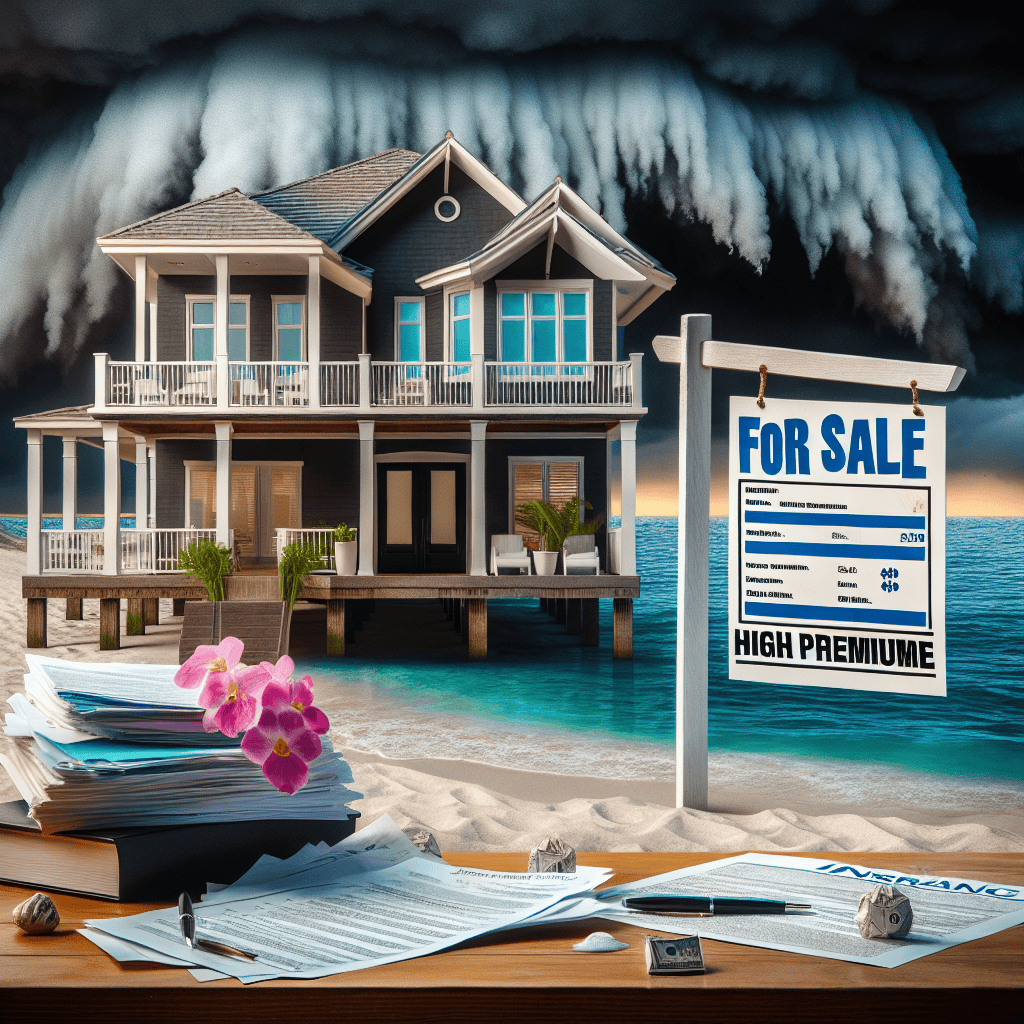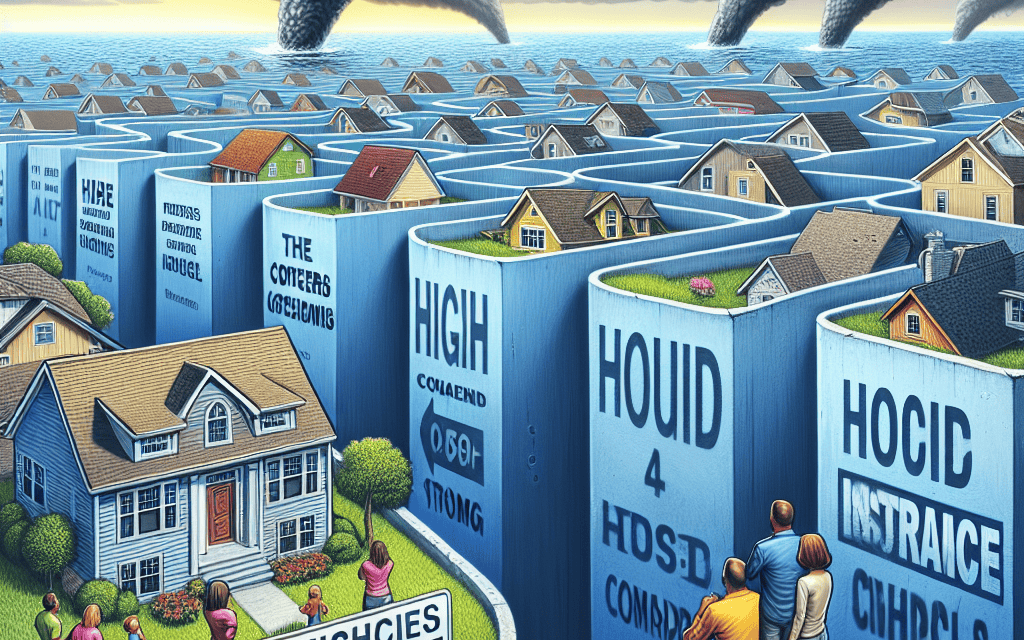“Florida’s Housing Dilemma: High Costs and Storm Fears Stall Market, Trapping Homeowners”
Introduction
Florida’s housing market is experiencing a significant downturn as escalating insurance costs and growing concerns over storm-related risks deter potential buyers, leaving many homeowners in a precarious position. The state’s vulnerability to hurricanes and extreme weather events has led to skyrocketing insurance premiums, making homeownership increasingly unaffordable for many. This financial strain, coupled with the heightened perception of risk, is causing a slowdown in real estate transactions, as prospective buyers reconsider their options. Consequently, homeowners find themselves trapped, unable to sell their properties or relocate, as the market grapples with these mounting challenges. This situation underscores the urgent need for solutions to address the financial and environmental pressures impacting Florida’s real estate landscape.
Impact Of Rising Insurance Costs On Florida’s Housing Market
Florida’s housing market, once a beacon of opportunity and growth, is currently facing significant challenges as rising insurance costs and increasing concerns about storm-related damages deter potential buyers. This shift in the market dynamics is leaving many homeowners in a precarious position, unable to sell their properties and move on. The impact of these factors is multifaceted, affecting not only individual homeowners but also the broader economic landscape of the state.
To begin with, the escalating insurance costs in Florida are a primary concern for both current homeowners and prospective buyers. The state, known for its susceptibility to hurricanes and tropical storms, has seen a marked increase in the frequency and intensity of these natural disasters. Consequently, insurance companies have raised premiums to mitigate the financial risks associated with storm damage. This increase in insurance costs has made homeownership less affordable, particularly for first-time buyers who are already grappling with high property prices. As a result, many potential buyers are reconsidering their decision to invest in Florida’s real estate market, opting instead for regions with lower insurance costs and perceived risks.
Moreover, the fear of storm-related damages is not unfounded. Recent years have witnessed devastating hurricanes that have caused extensive damage to properties across the state. The aftermath of these storms often leaves homeowners with significant repair costs, even after insurance payouts. This reality has heightened the anxiety among potential buyers, who are wary of the financial burden that could arise from future storms. The perception of Florida as a high-risk area for natural disasters is further compounded by climate change projections, which suggest an increase in the frequency and severity of such events. This has led to a growing reluctance among buyers to invest in properties that may be vulnerable to future climate-related impacts.
In addition to these challenges, the current homeowners in Florida find themselves in a difficult position. With fewer buyers in the market, selling a property has become increasingly challenging. Many homeowners are finding that they must lower their asking prices significantly to attract interest, which can result in financial losses. For those who are unable to sell, the burden of high insurance premiums and the potential for costly storm damage remains a constant concern. This situation is particularly troubling for retirees and those on fixed incomes, who may struggle to keep up with rising costs.
Furthermore, the broader economic implications of this housing market setback are significant. The real estate sector is a vital component of Florida’s economy, contributing to job creation and economic growth. A slowdown in the housing market can have ripple effects, impacting related industries such as construction, home improvement, and real estate services. Additionally, local governments may experience a decline in property tax revenues, which are crucial for funding public services and infrastructure projects.
In conclusion, Florida’s housing market is facing a major setback as high insurance costs and storm concerns drive buyers away, leaving homeowners stuck in a challenging situation. The interplay of these factors is reshaping the real estate landscape in the state, with significant implications for both individuals and the broader economy. As stakeholders grapple with these challenges, it is essential to explore solutions that can mitigate the impact of rising insurance costs and enhance the resilience of properties against storm-related damages.
How Storm Concerns Are Affecting Homebuyer Decisions In Florida
Florida’s housing market, long a beacon for those seeking sun-soaked shores and a vibrant lifestyle, is currently grappling with significant challenges that are reshaping homebuyer decisions. The state’s allure, characterized by its warm climate and picturesque landscapes, is being overshadowed by escalating insurance costs and growing concerns over storm-related risks. These factors are increasingly influencing potential buyers, leading to a noticeable shift in the dynamics of Florida’s real estate market.
To begin with, the rising cost of homeowners insurance in Florida is a critical factor deterring prospective buyers. Insurance premiums in the state have surged dramatically, driven by the increasing frequency and severity of hurricanes and tropical storms. Insurers, facing substantial payouts due to storm damage, have responded by raising rates to mitigate their financial risks. Consequently, potential homeowners are finding it increasingly difficult to afford the necessary coverage, which is a prerequisite for securing a mortgage. This financial burden is prompting many to reconsider their decision to purchase property in Florida, opting instead for regions with more stable insurance markets.
Moreover, the heightened awareness of climate change and its impact on weather patterns is further influencing homebuyer decisions. The specter of hurricanes and the associated risks of flooding and property damage are causing potential buyers to think twice before investing in Florida real estate. The state’s vulnerability to these natural disasters is well-documented, and recent years have seen a series of devastating storms that have left lasting impressions on both residents and prospective buyers. As a result, there is a growing perception that purchasing a home in Florida entails significant risk, not only to property but also to personal safety and financial stability.
In addition to these concerns, the broader economic implications of storm-related risks are also playing a role in shaping buyer behavior. The potential for property devaluation due to storm damage is a significant deterrent. Homes in high-risk areas may suffer from decreased market value, making them less attractive investments. This potential for loss is compounded by the uncertainty surrounding future climate conditions, which could exacerbate the frequency and intensity of storms. Consequently, buyers are increasingly cautious, seeking properties that offer greater security and resilience against these threats.
Furthermore, the impact of these factors extends beyond individual buyers to affect the overall housing market in Florida. Homeowners looking to sell are finding it more challenging to attract buyers, leading to longer listing times and, in some cases, reduced property values. This stagnation in the market is creating a ripple effect, impacting local economies that rely heavily on real estate transactions. The reluctance of buyers to enter the market is also affecting new construction projects, as developers face uncertainty about future demand.
In conclusion, the combination of high insurance costs and storm-related concerns is significantly influencing homebuyer decisions in Florida. These factors are reshaping the state’s housing market, creating challenges for both buyers and sellers. As the realities of climate change continue to unfold, it is likely that these issues will persist, necessitating adaptive strategies from all stakeholders involved. For Florida to maintain its appeal as a desirable place to live, it will be crucial to address these challenges head-on, ensuring that the state’s housing market can weather the storms of both nature and economics.
The Financial Strain On Homeowners Due To Florida’s Insurance Crisis
Florida’s housing market, once a beacon of opportunity and growth, is currently grappling with significant challenges that are reshaping the landscape for both potential buyers and existing homeowners. The state’s allure, characterized by its sunny climate and picturesque coastlines, is being overshadowed by escalating insurance costs and growing concerns over storm-related risks. These factors are not only deterring prospective buyers but also placing a substantial financial strain on current homeowners, who find themselves caught in a precarious situation.
The rising insurance premiums in Florida are a direct consequence of the state’s vulnerability to natural disasters, particularly hurricanes. In recent years, the frequency and intensity of these storms have increased, leading to substantial damage and, consequently, higher claims. Insurance companies, in an effort to mitigate their risks, have responded by significantly raising premiums. This increase has been so pronounced that many homeowners are now struggling to afford the necessary coverage, which is a prerequisite for obtaining a mortgage. As a result, the dream of homeownership in Florida is becoming increasingly elusive for many.
Moreover, the unpredictability of storm patterns has heightened the perceived risk associated with owning property in Florida. Potential buyers, wary of the financial implications of storm damage, are reconsidering their options. This hesitancy is reflected in the slowing pace of home sales, as the pool of interested buyers diminishes. The situation is further exacerbated by the fact that many insurance companies are either withdrawing from the Florida market or imposing stringent conditions on their policies, leaving homeowners with limited and costly options.
For those who already own homes in Florida, the financial burden is twofold. On one hand, they face the immediate challenge of affording rising insurance premiums. On the other hand, the devaluation of their properties, driven by decreased demand, poses a long-term financial threat. Homeowners who wish to sell are finding it increasingly difficult to attract buyers, forcing them to either lower their asking prices or remain in homes they can no longer afford to insure adequately.
In addition to these financial pressures, the psychological impact on homeowners cannot be overlooked. The constant threat of storms and the associated financial risks create an environment of uncertainty and stress. This situation is particularly challenging for retirees, a demographic that has traditionally been drawn to Florida for its favorable climate and tax benefits. Many retirees, living on fixed incomes, are finding it increasingly difficult to manage the rising costs, prompting some to consider relocating to less vulnerable areas.
In response to this crisis, there have been calls for legislative action to address the underlying issues. Proposals include the establishment of a state-backed insurance fund to provide more affordable coverage options and the implementation of stricter building codes to enhance the resilience of homes against storm damage. While these measures could offer some relief, they require time and political will to be effectively implemented.
In conclusion, Florida’s housing market is at a critical juncture, with high insurance costs and storm concerns driving buyers away and leaving homeowners in a difficult position. The financial strain on homeowners is palpable, as they navigate the challenges of rising premiums and declining property values. Without decisive action, the situation is likely to worsen, further destabilizing the market and impacting the broader economic landscape of the state.
Strategies For Homeowners To Navigate Florida’s Challenging Housing Market

Florida’s housing market, once a beacon of opportunity for both investors and homeowners, is currently facing significant challenges. The combination of escalating insurance costs and growing concerns over storm-related damages has created a complex environment that is driving potential buyers away and leaving current homeowners in a precarious position. As these issues continue to unfold, it is crucial for homeowners to adopt strategic approaches to navigate this challenging landscape effectively.
To begin with, understanding the root causes of the current market conditions is essential. Florida’s susceptibility to hurricanes and tropical storms has always been a factor in its real estate dynamics. However, the increasing frequency and intensity of these weather events have heightened concerns among potential buyers. Consequently, insurance companies have responded by raising premiums, making it more expensive for homeowners to protect their properties. This rise in insurance costs has, in turn, deterred many prospective buyers, who are now wary of the financial burdens associated with owning a home in Florida.
In light of these challenges, homeowners must explore strategies to mitigate the impact of high insurance costs. One effective approach is to shop around for the best insurance rates. By comparing quotes from multiple providers, homeowners can identify more affordable options that still offer comprehensive coverage. Additionally, investing in home improvements that enhance a property’s resilience to storms can lead to lower insurance premiums. For instance, installing impact-resistant windows or reinforcing roofs can make a home more attractive to insurers, potentially resulting in cost savings.
Moreover, homeowners should consider the benefits of diversifying their investment portfolios. Given the current volatility in Florida’s housing market, relying solely on property as an investment may not be prudent. By exploring other investment avenues, such as stocks or bonds, homeowners can reduce their financial risk and create a more balanced portfolio. This diversification can provide a safety net in case property values decline further or if selling a home becomes increasingly difficult.
Another strategy involves staying informed about local and state-level policy changes that could impact the housing market. For example, legislative efforts aimed at improving infrastructure or implementing stricter building codes could influence property values and insurance rates. By keeping abreast of these developments, homeowners can make informed decisions about when to buy, sell, or invest in home improvements.
Furthermore, engaging with local real estate professionals can provide valuable insights into market trends and opportunities. Realtors with experience in the Florida market can offer guidance on pricing strategies, marketing techniques, and timing for selling a home. Their expertise can be instrumental in navigating the complexities of the current market and maximizing the potential for a successful sale.
Finally, fostering a sense of community resilience can also be beneficial. By participating in neighborhood associations or local advocacy groups, homeowners can collaborate on initiatives that enhance community safety and preparedness for storms. These efforts not only contribute to a safer living environment but can also positively impact property values over time.
In conclusion, while Florida’s housing market is undoubtedly facing significant setbacks due to high insurance costs and storm concerns, homeowners are not without options. By adopting a proactive and informed approach, they can navigate these challenges effectively. Through strategic insurance management, investment diversification, staying informed about policy changes, leveraging professional expertise, and fostering community resilience, homeowners can position themselves to weather the current storm and emerge stronger in the long run.
The Role Of Climate Change In Florida’s Real Estate Market Trends
Florida’s real estate market, long a beacon for homebuyers seeking sun-soaked beaches and vibrant communities, is currently facing significant challenges. The state’s housing market, once characterized by rapid growth and high demand, is now experiencing a major setback. This shift is largely attributed to escalating insurance costs and growing concerns over the increasing frequency and intensity of storms, both of which are closely linked to climate change. As these factors converge, they are driving potential buyers away and leaving current homeowners in a precarious position.
The impact of climate change on Florida’s real estate market cannot be overstated. Rising sea levels and the heightened risk of hurricanes have made certain areas more vulnerable, leading to increased insurance premiums. Insurers, recognizing the heightened risk, have adjusted their rates accordingly, making it more expensive for homeowners to protect their properties. This rise in insurance costs is a significant deterrent for potential buyers, who are now more cautious about investing in areas prone to natural disasters. Consequently, the demand for homes in these regions has diminished, causing a ripple effect throughout the market.
Moreover, the perception of risk associated with climate change is influencing buyer behavior. Prospective homeowners are increasingly factoring in the potential for future climate-related events when making purchasing decisions. This shift in mindset is not only affecting coastal areas but also impacting inland regions, as buyers seek properties that are perceived to be safer from the effects of climate change. As a result, the real estate market in Florida is experiencing a geographical shift, with demand moving away from high-risk areas.
In addition to insurance costs and buyer perceptions, the physical impact of climate change is also playing a role in shaping Florida’s housing market trends. The increased frequency of severe weather events has led to more frequent and costly repairs for homeowners. This has further strained the finances of those living in vulnerable areas, making it difficult for them to maintain their properties or sell them at a desirable price. Consequently, many homeowners find themselves stuck, unable to move or upgrade due to the financial burden imposed by climate-related damages.
Furthermore, the broader economic implications of climate change are beginning to manifest in Florida’s real estate market. As the state grapples with the costs associated with climate adaptation and mitigation, public resources are being stretched thin. This has led to concerns about the long-term sustainability of infrastructure and public services, which are critical factors for homebuyers. The uncertainty surrounding these issues is contributing to a cautious approach among potential buyers, further dampening demand.
In light of these challenges, stakeholders in Florida’s real estate market are exploring strategies to adapt to the changing landscape. Some are advocating for stricter building codes and improved infrastructure to enhance resilience against climate-related events. Others are calling for policy interventions to address the affordability of insurance and to incentivize sustainable development practices. While these efforts may offer some relief, the underlying issue of climate change remains a formidable challenge that requires comprehensive and coordinated action.
In conclusion, Florida’s housing market is facing a major setback as high insurance costs and storm concerns, driven by climate change, deter buyers and leave homeowners in a difficult position. The interplay of these factors is reshaping the state’s real estate landscape, prompting a reevaluation of risk and value. As Florida navigates this complex environment, the need for innovative solutions and proactive measures becomes increasingly urgent to ensure the long-term stability and resilience of its housing market.
Long-Term Effects Of High Insurance Costs On Florida’s Property Values
Florida’s housing market, once a beacon of opportunity and growth, is currently grappling with significant challenges that threaten its long-term stability. The state’s property values, which have historically been buoyed by its desirable climate and attractive lifestyle, are now under pressure due to escalating insurance costs and increasing concerns about storm-related risks. These factors are not only deterring potential buyers but also leaving current homeowners in a precarious position, unable to sell or refinance their properties without incurring substantial financial losses.
The rising insurance costs in Florida are primarily driven by the state’s vulnerability to natural disasters, particularly hurricanes. In recent years, the frequency and intensity of these storms have increased, leading to higher claims and, consequently, higher premiums. Insurance companies, facing mounting losses, have either raised their rates significantly or withdrawn from the market altogether. This has left homeowners with fewer options and higher costs, making it increasingly difficult for them to maintain their properties affordably.
As insurance costs soar, potential buyers are becoming more cautious. The prospect of high monthly premiums adds a considerable burden to the overall cost of homeownership, making Florida properties less attractive compared to those in other states with lower insurance expenses. This shift in buyer sentiment is beginning to manifest in the form of reduced demand, which, in turn, is exerting downward pressure on property values. As demand wanes, sellers are finding it challenging to achieve their desired sale prices, leading to longer listing times and, in some cases, forced price reductions.
Moreover, the uncertainty surrounding future storm activity further exacerbates the situation. Climate change models predict that Florida will continue to experience severe weather events, which not only heightens the risk of property damage but also perpetuates the cycle of rising insurance costs. This looming threat creates a sense of instability in the market, discouraging long-term investment and prompting potential buyers to seek safer, more predictable environments.
The implications of these trends extend beyond individual homeowners and buyers. The broader economic impact on Florida’s real estate market could be profound, affecting everything from local government revenues, which rely heavily on property taxes, to the construction industry, which may see a slowdown in new developments. As property values stagnate or decline, municipalities may face budget shortfalls, leading to cuts in public services or increased taxes to compensate for the lost revenue.
In response to these challenges, stakeholders are exploring various strategies to mitigate the impact of high insurance costs and storm concerns. Some propose legislative reforms to stabilize the insurance market, while others advocate for improved building codes and infrastructure investments to enhance the state’s resilience to natural disasters. However, these solutions require time, coordination, and significant financial resources, and their effectiveness remains uncertain.
In conclusion, Florida’s housing market is at a critical juncture, with high insurance costs and storm concerns posing significant threats to property values. The long-term effects of these challenges could reshape the state’s real estate landscape, necessitating proactive measures to safeguard its economic future. As stakeholders work to address these issues, the outcome will likely determine whether Florida can maintain its status as a desirable destination for homeowners and investors alike.
Potential Solutions To Revitalize Florida’s Stagnant Housing Market
Florida’s housing market, once a beacon of opportunity and growth, is currently grappling with significant challenges that threaten its stability and appeal. The combination of soaring insurance costs and increasing concerns over storm-related damages has created a formidable barrier for potential homebuyers, leaving many homeowners in a precarious position. As these issues persist, it becomes imperative to explore potential solutions that could revitalize the state’s stagnant housing market and restore confidence among both buyers and sellers.
One potential solution lies in addressing the root cause of the high insurance costs that have become a deterrent for many prospective buyers. The state could consider implementing regulatory reforms aimed at stabilizing the insurance market. By encouraging competition among insurance providers and offering incentives for companies that offer affordable and comprehensive coverage, Florida could alleviate some of the financial burdens currently faced by homeowners. Additionally, the state could explore the establishment of a state-backed insurance program that provides a safety net for those in high-risk areas, thereby reducing the overall cost of insurance premiums.
Moreover, enhancing infrastructure resilience is another critical step towards revitalizing Florida’s housing market. As climate change continues to exacerbate the frequency and intensity of storms, investing in robust infrastructure that can withstand these natural disasters is essential. This could involve upgrading drainage systems, reinforcing building codes, and implementing advanced technologies for early storm detection and response. By demonstrating a commitment to safeguarding communities against the impacts of severe weather, Florida can instill confidence in potential buyers and encourage investment in the housing market.
In addition to these measures, fostering community engagement and education is vital. Homeowners and potential buyers need to be informed about the risks associated with living in storm-prone areas and the steps they can take to mitigate these risks. Public awareness campaigns, workshops, and seminars can play a crucial role in educating residents about the importance of disaster preparedness and the benefits of investing in resilient home features. By empowering individuals with knowledge and resources, Florida can create a more informed and proactive community that is better equipped to handle the challenges posed by natural disasters.
Furthermore, collaboration between government entities, private sector stakeholders, and local communities is essential for driving meaningful change in Florida’s housing market. Public-private partnerships can facilitate the development of innovative solutions that address both insurance costs and storm concerns. For instance, incentivizing the construction of energy-efficient and storm-resistant homes through tax breaks or grants could attract developers and buyers alike. Additionally, leveraging technology to create platforms that connect homeowners with resources for retrofitting and upgrading their properties can further enhance the market’s resilience.
While these potential solutions offer a roadmap for revitalizing Florida’s housing market, it is crucial to recognize that addressing these challenges requires a multifaceted approach. Policymakers, industry leaders, and residents must work collaboratively to implement strategies that balance economic growth with environmental sustainability. By prioritizing resilience, affordability, and community engagement, Florida can overcome the current setbacks and pave the way for a more robust and dynamic housing market. Ultimately, the success of these efforts will depend on the collective commitment to creating a future where Florida’s housing market thrives despite the challenges posed by high insurance costs and storm concerns.
Q&A
1. **Question:** What is causing the setback in Florida’s housing market?
**Answer:** High insurance costs and storm concerns are causing the setback.
2. **Question:** How are high insurance costs affecting potential buyers?
**Answer:** High insurance costs are driving potential buyers away.
3. **Question:** What impact do storm concerns have on the housing market?
**Answer:** Storm concerns are deterring buyers from purchasing homes in Florida.
4. **Question:** What is the effect on current homeowners in Florida?
**Answer:** Homeowners are finding themselves stuck, unable to sell their properties easily.
5. **Question:** Are there any specific regions in Florida more affected by these issues?
**Answer:** Coastal areas are typically more affected due to higher storm risks and insurance costs.
6. **Question:** How might this situation impact the overall economy of Florida?
**Answer:** The housing market setback could slow economic growth and reduce property tax revenues.
7. **Question:** What are potential solutions to address these housing market challenges?
**Answer:** Solutions could include government intervention to stabilize insurance costs and improve infrastructure to mitigate storm damage.
Conclusion
Florida’s housing market is experiencing significant challenges due to escalating insurance costs and heightened concerns over storm-related risks. These factors are deterring potential buyers, leading to a slowdown in property sales. Homeowners find themselves in a difficult position, as the reduced demand limits their ability to sell properties at desired prices or within expected timeframes. The combination of financial burdens from insurance premiums and the threat of natural disasters is reshaping the real estate landscape in Florida, potentially leading to longer-term economic implications for the state’s housing market.





